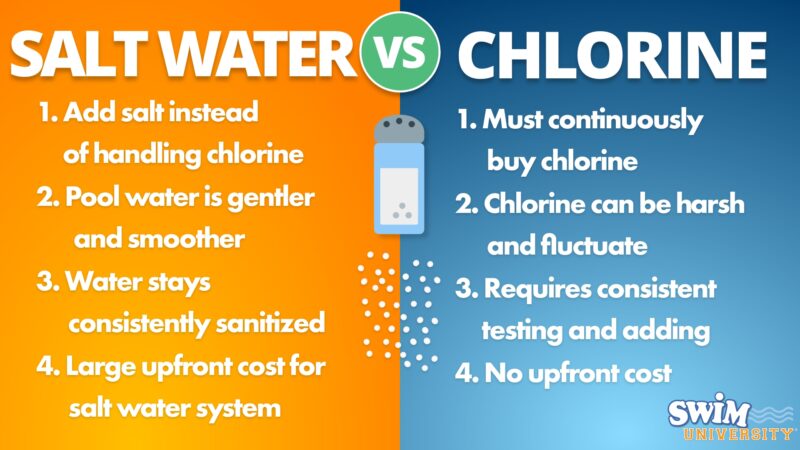Welcome to our comprehensive guide on balancing chemicals in a salt water pool! Maintaining proper chemical balance in your salt water pool is crucial for keeping the water clean, clear, and safe for swimming. By understanding the key components and methods for balancing chemicals, you can ensure that your pool remains a refreshing oasis all season long.
The Importance of Balancing Chemicals
Properly balanced chemicals in a salt water pool help prevent algae growth, bacterial contamination, and eye irritation. Balancing the pH, chlorine levels, alkalinity, and calcium hardness is essential for optimal pool health.

Credit: www.swimuniversity.com
Key Chemicals to Balance
Here are the key chemicals you need to balance in your salt water pool:
- 1. pH Level
- 2. Chlorine Level
- 3. Total Alkalinity
- 4. Calcium Hardness

Credit: www.frogproducts.com
1. pH Level
The pH level of your pool water should typically be between 7.2 and 7.6. pH levels outside this range can cause skin and eye irritation, corrode pool equipment, and reduce the effectiveness of chlorine.
2. Chlorine Level
Chlorine is essential for killing bacteria and keeping your pool water clean. The ideal chlorine level for a salt water pool is between 1 and 3 parts per million (ppm). Regularly test and adjust the chlorine levels to maintain a healthy swimming environment.
3. Total Alkalinity
Total alkalinity helps stabilize the pH level of your pool water. The recommended total alkalinity range is between 80 and 120 ppm. Proper alkalinity levels prevent pH fluctuations and ensure that your pool water remains balanced.
4. Calcium Hardness
Calcium hardness refers to the amount of dissolved calcium in your pool water. The ideal calcium hardness level for a salt water pool is between 200 and 400 ppm. Proper calcium hardness levels help prevent scale formation and corrosion of pool surfaces.
How to Balance Chemicals
Now that you understand the key chemicals to balance, here are some tips on how to maintain proper chemical levels in your salt water pool:
1. Regular Testing
Use a reliable pool water testing kit to monitor the pH, chlorine, alkalinity, and calcium hardness levels regularly. Testing should be done at least once a week to ensure that the chemicals are within the recommended ranges.
2. Adjusting Ph Levels
If the pH level is too high, add a pH decreaser. If the pH level is too low, add a pH increaser. Follow the manufacturer’s instructions and retest the water after making adjustments.
3. Chlorine Maintenance
Monitor the chlorine levels and adjust as needed using a salt chlorinator or liquid chlorine. Shock the pool regularly to eliminate contaminants and maintain proper chlorine levels.
4. Balancing Alkalinity
If the total alkalinity is too high, use an alkalinity reducer. If it is too low, add an alkalinity increaser. Balancing alkalinity helps prevent pH fluctuations and ensures water clarity.
5. Calcium Hardness Adjustment
If the calcium hardness level is outside the recommended range, use a calcium hardness increaser or reducer to bring it within the desired range. Proper calcium hardness levels protect your pool equipment and surfaces.
Additional Tips for Chemical Balance
Here are some additional tips to help you maintain proper chemical balance in your salt water pool:
- 1. Keep pool water circulation and filtration systems running efficiently.
- 2. Clean pool filters regularly to ensure optimal water clarity.
- 3. Maintain proper pool water levels to prevent chemical imbalances.
- 4. Avoid adding chemicals in large quantities; instead, make gradual adjustments.
- 5. Seek professional advice if you are unsure about balancing pool chemicals.
In Conclusion
Ensuring that the chemicals in your salt water pool are properly balanced is essential for maintaining a safe and enjoyable swimming environment. By regularly testing and adjusting the pH, chlorine, alkalinity, and calcium hardness levels, you can keep your pool water clean, clear, and inviting for all swimmers. Remember to follow the manufacturer’s instructions for all pool chemicals and seek professional help if needed. With the right balance of chemicals, your salt water pool will provide endless hours of relaxation and fun for you and your family.



